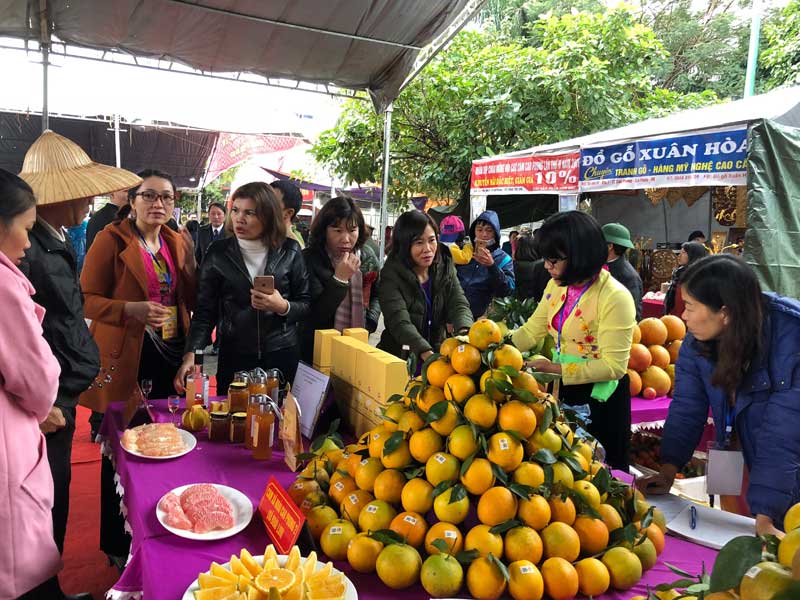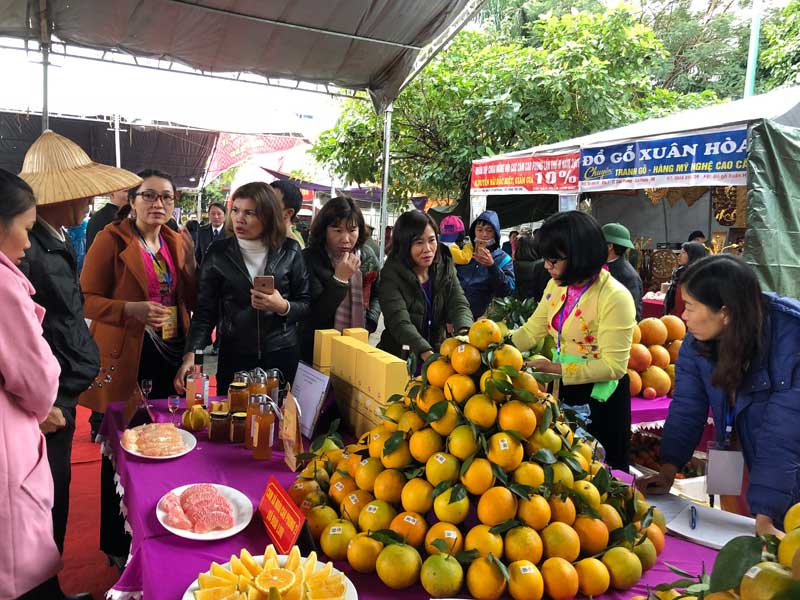
(HBO) – A citrus fruit festival and agricultural fair took place in mid-December in the northern province of Hoa Binh as part of the activities to promote local citrus fruits.
In recent
years, the area of citrus fruits in the province has increased to 9,700
hectares in 2018 from 1,976 hectares in 2013, yielding 123,000 tonnes.
The fruits are mainly grown in nine out of the
11 districts and city, including oranges in Cao Phong, Lac Thuy, Kim Boi and
Lac Son districts, and grapefruits in Tan Lac and Yen Thuy districts. In Cao
Phong alone, the area of citrus fruits covers over 3,000 hectares, including
1,300 ha ready for harvest with an estimated output of 36,000 tonnes, up 3,000
tonnes against 2017. Lac Thuy district has 1,045 hectares of these fruits,
including 400 hectares ready for harvest, yielding over 8,000 tonnes.

Cao Phong
oranges promoted at the citrus fruit festival and agricultural fair win trust
of customers thanks to its clear label of origin.
To protect the brand of citrus fruits, the local
agriculture and rural development sector has applied a number of measures in
recent years, including the control of the quality of varieties. Unscheduled and
periodical inspections are carried out annually to prevent low-quality
agricultural supplies, especially fake fertiliser and unsafe seedlings from
entering the local market.
The provincial plantation and plant protection division
said it has conducted inspections over 500 establishments trading agricultural
supplies on the use of pesticides, production procedures, and breeding sales.
They found no violation.
Since 2015, the province has successfully built
geographical indicators for Cao Phong, Lac Thuy orange and Tan Lac red-flesh
grapefruit. To protect the brand of the fruits, local gardeners have applied
science technology into production, meeting requirements on fruit hygiene and
safety. In Cao Phong district, about 800 hectares of oranges were certified
with Vietnamese Good Agricultural Practices (VietGAP), labelled with trace of
origin and packaged to prevent counterfeit products. Meanwhile, in Tan Lac
district, some 52 hectares of red-flesh grapefruits received VietGAP
certification./.
According to data from the Hoa Binh Provincial Party Committee, the industrial production index for the first six months of 2025 is estimated to have increased by 20% compared to the same period last year. This marks the highest year-on-year growth rate for this period since 2020.
In the first six months of 2025, Hoa Binh province’s export turnover was estimated at 1.145 billion USD, marking an 18.11% increase compared to the same period in 2024. Import turnover was estimated at $ 804 million, a 17.15% increase, which helped the province maintain a positive trade balance.
The lives of the ethnic minority farmers in Tan Lac district have gradually improved thanks to the new directions in agricultural production. This is a testament to the collective strength fostered through the professional associations and groups implemented by various levels of the district’s Farmers’ Union.
With the motto the "product quality comes first,” after nearly one year of establishment and operation, Muong village’s Clean Food Agricultural and Commercial Cooperative, located in Cau Hamlet, Hung Son Commune (Kim Boi district), has launched reputable, high-quality agricultural products to the market that are well-received by consumers. The products such as Muong village’s pork sausage, salt-cured chicken, and salt-cured pork hocks have gradually carved out a place in the market and they are on the path to obtaining the OCOP certification.
In the past, the phrase "bumper harvest, rock-bottom prices" was a familiar refrain for Vietnamese farmers engaged in fragmented, small-scale agriculture. But today, a new spirit is emerging across rural areas of Hoa Binh province - one of collaboration, organisation, and collective economic models that provide a stable foundation for production.
Maintaining growing area codes and packing facility codes in accordance with regulations is a mandatory requirement for agricultural products to be eligible for export. Recently, the Department of Agriculture and Environment of Hoa Binh province has intensified technical supervision of designated farming areas and packing facilities to safeguard the "green passport" that enables its products to access international markets.



